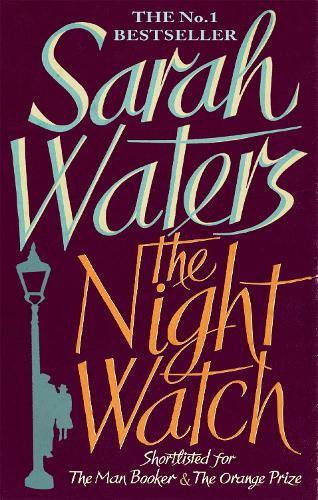Well what a book! I don't quite know how to review The Night Watch without revealing too much of the story line. This isn't a plot based book as such and so to gloss over what little there is in this blog might take something away from the reader which I don't want to do.
The book was lent to me from a friend (who has an excellent blog by the way:
https://beverleyhasread.wordpress.com/) but to be honest I didn't really fancy it from the blurb which I thought was the weakest part of the book. However I had previously read two of Waters' books (Tipping the Velvet and the excellent Fingersmith) and with it being strongly recommended I set to work.
The book skips about in London during the second world war and is centred around 3 women and 1 man. It took my a while to get to grips with everyone and it was strange to have a man interspersed within the women's stories. However Duncan's story fitted into the overreaching arc of the book and provided an interesting angle. Having read Tipping the Velvet and Fingersmith I should have known what to expect with The Night Watch however the theme set to the back drop of the war surprised me and wasn't hinted at in the blurb.
I initially found the book slow especially, surprisingly, compared to the recently read Vanity Fair which was almost double in length. Typical of Waters were the complicated characters repeating mistakes and destined to be unhappy by their own making. It was a tad graphic in places but then Waters often is and I found myself slowly warming to the book as it progressed (or should that be regressed?)
I loved the contrast between Helen's relationship in the first part of the story compared to the second. I felt retrospectively angry at Viv in the first part of the book when reading the second and similarly sympathetic to Kay. To totally change a readers perspective takes skill and Waters excellent writing pulled it off brilliantly.
The topsy turvy timeframe really added an extra dimension to the prose lead book. It was only as I approached the last 50 or so pages that I realised the story line wouldn't be coming to an 'end' and I liked the book more because of it. I wouldn't say it is as good as Fingersmith but it is a grower and I can't wait to discuss it at book club with people who have read it where I won't have to worry about giving away too much. Read it if you want to find out more!
The book was lent to me from a friend (who has an excellent blog by the way:
https://beverleyhasread.wordpress.com/) but to be honest I didn't really fancy it from the blurb which I thought was the weakest part of the book. However I had previously read two of Waters' books (Tipping the Velvet and the excellent Fingersmith) and with it being strongly recommended I set to work.
The book skips about in London during the second world war and is centred around 3 women and 1 man. It took my a while to get to grips with everyone and it was strange to have a man interspersed within the women's stories. However Duncan's story fitted into the overreaching arc of the book and provided an interesting angle. Having read Tipping the Velvet and Fingersmith I should have known what to expect with The Night Watch however the theme set to the back drop of the war surprised me and wasn't hinted at in the blurb.
I initially found the book slow especially, surprisingly, compared to the recently read Vanity Fair which was almost double in length. Typical of Waters were the complicated characters repeating mistakes and destined to be unhappy by their own making. It was a tad graphic in places but then Waters often is and I found myself slowly warming to the book as it progressed (or should that be regressed?)
I loved the contrast between Helen's relationship in the first part of the story compared to the second. I felt retrospectively angry at Viv in the first part of the book when reading the second and similarly sympathetic to Kay. To totally change a readers perspective takes skill and Waters excellent writing pulled it off brilliantly.
The topsy turvy timeframe really added an extra dimension to the prose lead book. It was only as I approached the last 50 or so pages that I realised the story line wouldn't be coming to an 'end' and I liked the book more because of it. I wouldn't say it is as good as Fingersmith but it is a grower and I can't wait to discuss it at book club with people who have read it where I won't have to worry about giving away too much. Read it if you want to find out more!

Comments
Post a Comment